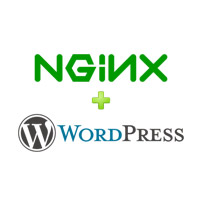Wordpress with Nginx


Please feel free to contact us
Go
WordPress, a content management system (CMS) and probably the world’s most popular web publishing platform is known to be used for anything ranging from a just personal blog to a full business site. And Nginx works perfectly well with a wide variety of applications, and WordPress is certainly one of them.
Miri Infotech, one of the leading IT solutions providers is configuring WordPress with Nginx, a WordPress e-commerce platform which is embedded with Ubuntu along with ready-to-launch AMI on AWS EC2 that contains Apache, MySQL, Linux, PHP (LAMP).
WordPress is currently the fastest growing CMS software in the industry and its architecture is a front controller, routing all requests for non-static URLs to a single PHP file which parses the URL and recognizes the target page. This gives support to more human-readable permalinks. Nginx’s configuration language is extremely dominant and straightforward if one is familiar with it.
Nginx is a highly optimized, extremely light and fast web server created for sustained performance under increasing stress i.e. the number of requests and number of concurrent users. Considering the benefits, it comes as no surprise that numerous WordPress powered websites are moving towards Nginx hosting. WordPress with Nginx syndicates the most popular blogging app with the dynamic Nginx web server. Moreover, it also streamlines the configuration to secure it.
WordPress supports Nginx, and most of the large WordPress sites, such as WordPress.com, are powered by Nginx. It is really vital to know that there are multiple ways to implement Nginx with WP. It can be set up as a reverse-proxy in front of Apache, which is a very powerful set up that allows you to use all of the features and power of Apache while benefitting from the speed of Nginx.
Nginx is perfect for serving static content and this is where it outshines all the competition. A typical WordPress blog comprises of static content such as CSS, scripts, and images, Nginx can serve both a server and cache. To use Nginx fully up to its potential, experts suggest using a cookieless domain for static assets so that the content is truly cached by the web browser.
Miri InfoTech provides hardened images of WP e-commerce on the AWS marketplace. The company provides secure, up-to-date, and best cloud computing services to a varied client base all across the world. Our network of expert WordPress developers have more experience than any other WordPress e-commerce consultants and they’d love to help you. The major benefit of working with Miri is that you will get to work with dedicated, highly qualified, talented, and experienced developers.
You can subscribe to wordpress with nginx, an AWS Marketplace product and launch an instance from the wordpress with nginx product's AMI using the Amazon EC2 launch wizard.
Step 1: Open Putty for SSH
Step 2: Open Putty and Type <instance public IP> at “Host Name” and Type "ubuntu" as user name Password auto taken from PPK file
Step 3: Use following Linux command to change the host.
Command: sudo vi /etc/hosts
Take the Private Ip address from your machine as per the below screenshot and add it as the second line of the file as shown in screenshot below:
Step 4: Use the following command to start wordpress:
Command: sudo nano /etc/nginx/sites-available/wordpress
Replace the “server_name” value with the public IP of the running instance.
Command:sudo ln -s /etc/nginx/sites-available/wordpress /etc/nginx/sites-enabled/
Command: service nginx restart
Step 5: Hit the browser with the public IP of the running instance: http://<publicIP>
Select the language and click “Continue”.
Step 6: Enter the details as you like and click “Install WordPress”.
Step 7: Click on “Log in”. Enter the admin details as you have set and enjoy the dashboard.
All your queries are important to us. Please feel free to connect.
24X7 support provided for all the customers.
We are happy to help you.
Submit your Query: https://miritech.com/contact-us/
Contact Numbers:
Contact E-mail:
Traditional hosting services generally provide a pre-configured resource for a fixed amount of time and at a predetermined cost. Amazon EC2 differs fundamentally in the flexibility, control and significant cost savings it offers developers, allowing them to treat Amazon EC2 as their own personal data center with the benefit of Amazon.com’s robust infrastructure.
When computing requirements unexpectedly change (up or down), Amazon EC2 can instantly respond, meaning that developers have the ability to control how many resources are in use at any given point in time. In contrast, traditional hosting services generally provide a fixed number of resources for a fixed amount of time, meaning that users have a limited ability to easily respond when their usage is rapidly changing, unpredictable, or is known to experience large peaks at various intervals.
Secondly, many hosting services don’t provide full control over the compute resources being provided. Using Amazon EC2, developers can choose not only to initiate or shut down instances at any time, they can completely customize the configuration of their instances to suit their needs – and change it at any time. Most hosting services cater more towards groups of users with similar system requirements, and so offer limited ability to change these.
Finally, with Amazon EC2 developers enjoy the benefit of paying only for their actual resource consumption – and at very low rates. Most hosting services require users to pay a fixed, up-front fee irrespective of their actual computing power used, and so users risk overbuying resources to compensate for the inability to quickly scale up resources within a short time frame.
No. You do not need an Elastic IP address for all your instances. By default, every instance comes with a private IP address and an internet routable public IP address. The private address is associated exclusively with the instance and is only returned to Amazon EC2 when the instance is stopped or terminated. The public address is associated exclusively with the instance until it is stopped, terminated or replaced with an Elastic IP address. These IP addresses should be adequate for many applications where you do not need a long lived internet routable end point. Compute clusters, web crawling, and backend services are all examples of applications that typically do not require Elastic IP addresses.
Taking control of your site with a content management system also has great advantages as far as your search engine rankings are concerned. All search engines like to see that websites are updated regularly and favor sites that alter their content on a regular basis. Our CMS platform provides search engine friendly web pages and also allows you to create your own page titles and meta tags used by the Search Engines for page rankings.
Requirements gathering is crucial, to make sure you buy on what you need, not on the shiny features that look good in the demonstration.
The Web CMS does not require any special software or any technical knowledge to use. It is a web-based platform and can be accessed wherever you have an Internet connection and a web browser. The interface is very similar to Microsoft Word and does all of the HTML coding for you. You can concentrate on the content and not worry about how it will affect the page layout. It also automatically optimizes your site’s content for search, so that when someone searches for information on your site it is more likely to be found./p>
Powerful Statistics
No HTML Editing or FTP Software Required
Customizable
 Wordpress with Nginx
Wordpress with Nginx
 php
php
 apache
apache
 mysql
mysql
 linux
linux